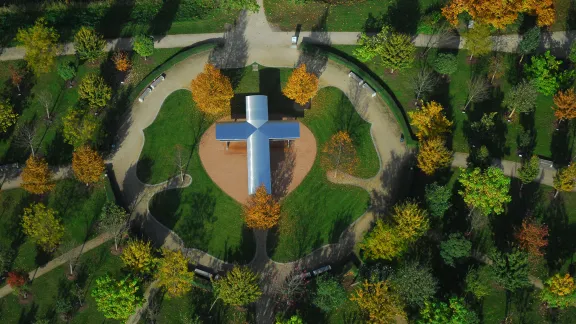
500 years of Reformation – 500 Trees in Wittenberg: the Luthergarten is a living, international, and ecumenical monument, planted for the Reformation anniversary in 2017; as a symbol of the commitment of the LWF to advocating for Climate Justice, and equipping member churches to care for creation. Photo: LWF
Lutheran churches mark the Reformation anniversary in diverse contexts
(LWI) – Reformation Day, 31 October, commemorates the occasion in 1517 when Martin Luther nailed his Ninety-Five Theses on the door of the Castle Church in Wittenberg, Germany, as a sign of protest. He wanted to initiate an academic debate because he opposed the prevailing view that salvation from sin was possible through absolution in the form of a payment of money. Instead, he insisted on justification through faith.
On 31 October 1999, Lutherans and Catholics signed the Joint Declaration on the Doctrine of Justification (JDDJ) in Augsburg, Germany. This historic agreement resolved centuries-old controversies and misunderstandings on the “basic truths” of salvation as a free gift from God.
In 2024, some member churches of The Lutheran World Federation (LWF) take up this anniversary in their Reformation Day events.
Relevance of the JDDJ today
The Evangelical Lutheran Church in Northern Germany (Nordkirche) is hosting its traditional Reformation Reception under the theme “Walking Together” with representatives of the Catholic Church. “In a world suffering from wars and various forms of violence and polarization that divide the human family, the JDDJ is a sign of peace, pointing to the possibility of reconciliation,” says Bishop Kristina Kühnbaum-Schmidt, who is also LWF Vice-President for Central Western Europe. Today, the challenge was, “How can we succeed in trusting in the power of grace in a merciless time.”
The JDDJ is a sign of peace, pointing to the possibility of reconciliation.
Bishop Kristina Kühnbaum-Schmidt, LWF Vice-President for Central Western Europe
With the theme “Heroes of the South”, the Lutheran Communion in Southern Africa (LUCSA) focuses on reformers in LUCSA member churches who have made significant theological impacts in their churches and beyond, with an invitation to honor Rev. Dr. Johannes Lukas de Vries (1939-2001) which is live-streamed on Facebook on Reformation Day. De Vries was the first non-white President of the Evangelical Lutheran Church in South West Africa (ELK/SWA), now called the Evangelical Lutheran Church in the Republic of Namibia (ELCRN). He advocated Black Theology in Namibia and was committed to peaceful liberation.
Believing in God and serving the neighbor
“The Reformation embraces us in serving the neighbor” was the theme at the Alto Uruguay Congregation, Misiones, of the Evangelical Church of the River Plate (IERP) in Argentina last Sunday. “Our church service visualized the deep meaning of what it means to be a church that comes from the Lutheran Reformation; it helped us to remember that we are free to serve and to love,” said District Pastor Dario Dorsch.
To put that message into practice, groups of congregants addressed topics related to diakonia in their district. One group focused on visiting patients in the regional hospital and getting to know a church initiative supporting people facing difficult situations in hospitals. Another group focused on supporting Indigenous communities, highlighting the “Tape Porá” project, which has benefited 16 communities through improvements in infrastructure and access to water and electricity.
The day concluded with “The Embrace” by the district’s youth, highlighting the therapeutic and emotional power of embracing as an expression of solidarity and communion. During the closing worship, unity in the church was demonstrated by participants holding hands, sharing hugs and reciting the Lord’s Prayer together, renewing their commitment to faith and service to the community.
Reformation celebrations in the Lutheran Church in Singapore aim to strengthen Christian communion and include Anglicans, Methodists, Presbyterians and Lutherans. They comprise a joint dinner, followed by a program with a message by Bishop Lu Guan Hoe and presentations by groups such as “Women in Church and Society”, an intergenerational group and a dance group.


